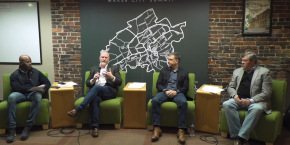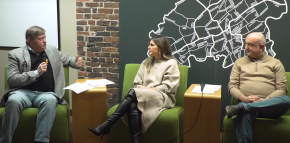
First session of three-part series on angel investing includes a lot of advice
 By Tom Ballard, Chief Alliance Officer, PYA
By Tom Ballard, Chief Alliance Officer, PYA
The importance of engaging with others, understanding the risk, cultivating and building networks, and “chemistry,” not exactly in the technical definition of the word, were concepts that were repeated several times during a nearly 90-minute hybrid panel discussion late Tuesday afternoon focused on investment capital.
About 30 people signed-up for the first session in a three-part series designed to build a stronger base of angel investors in the Knoxville region. The initiative, offered under the “Opportunities on the Horizon” umbrella, is a joint effort of the Knoxville Chamber, Knoxville Entrepreneur Center (KEC), and Innov865 Alliance. It originated from KEC’s Market Square offices and was delivered via the YouTube platform (click here for link to watch), starting with a kickoff from Nadim Jubran, Vice Chair of the Chamber’s Entrepreneurship/Small Business Council.
“We need 100 self-identified angels actively investing here,” said Eric Dobson, Chief Executive Officer (CEO) of the Sheltowee Angel Network and Managing Partner of Sheltowee’s CleanTech Fund I. He was one of five people participating on two panels. Joining Dobson on the first panel, moderated by KEC Executive-in-Residence Richard Dapaah, were John Morris, Executive Vice President of The Lighthouse Fund, and Derren Burrell, Founder and President of Veteran Ventures Capital. All four individuals are Knoxville-based.
The second panel, which Morris literally changed chairs to moderate, featured two other Knoxvillians – Bill Malkes, a serial entrepreneur who is currently the CEO of NellOne Therapeutics Inc., and Tricia Martinez, Managing Director of the new “Techstars Industries of the Future Accelerator.” All three shared their experiences growing start-ups and the importance of angel capital.

Noting that angel investing is a “high risk endeavor,” Morris advised those that are new to the process to “look for a lead investor that has already defined the terms (of an investment). If that doesn’t exist, look at the company’s capacity to pay.” Later, in response to a question about source of deals, he reiterated that being part of a group or network of investors is a good thing. “Just like anything, it’s the relationships” you establish and cultivate, Morris advised.
Dobson reinforced the risk involved in angel investing. “This is not a retirement plan. If you lose it (your investment), you’ll cry in your beer, but you’ll get over it.”
A good deal of the discussion for the first panel focused on the concept of accredited investors which are defined by the Securities and Exchange Commission (SEC) under Rule 501 as having: (1) earned income that exceeded $200,000 (or $300,000 together with a spouse or spousal equivalent) in each of the prior two years and reasonably expects the same for the current year; or (2) a net worth over $1 million, either alone or together with a spouse or spousal equivalent (excluding the value of the person’s primary residence).
“The SEC rules are there to protect the investor and the company,” Morris explained. “If you are not accredited and want to invest, you are putting the onus on the company” to make sure all rules are followed.
That discussion prompted Burrell to say, “Don’t let that (regulatory guidance) deter you. I would highly encourage people to learn more.” A few minutes earlier, Dobson had reminded attendees that angel investing “is a learned activity, and you learn by doing it.” He also said it was a lot of fun to invest time and money in young companies.

Martinez, who moved to Knoxville to run the new Techstars accelerator that launches next month, described a start-up she and her husband founded named Wala. It was a South Africa-based fintech company that planned to roll out its own cryptocurrency across the continent, but closed in 2019 after failing to secure the necessary funding to continue operations.
“Angel investors drove our company forward,” Martinez told attendees, mentioning individuals tied to successful start-ups like OpenTable and Grubhub. “I scoured LinkedIn and cold-called people every day.”
Malkes shared another way to identify potential angel investors, in his case from years ago when he lived in Michigan. What did he do? Looked at real estate transactions for individuals who sold houses for more than one million dollars at the time and contacted them.
While angels were not that important in the growth of GRIDSMART – “Vig (Sherrill) and I angel-funded GRIDSMART ourselves,” Malkes said they have been “absolutely critical for NellOne.”
That said, both individuals noted that it is not always the best decision to take any capital that is offered. “Chemistry (between us and the investor) is so important,” Malkes said. “We have turned down investors in the past. Think of it (the process) like dating and marriage.” Martinez added to the words of caution by saying, “The wrong angel investor could be a virus to your company. Dumb money is a real thing.”
With new companies being founded locally and others coming in through initiatives like the “Techstars Industries of the Future Accelerator” and the “Innovation Crossroads” program operated by Oak Ridge National Laboratory, the need for more investment capital and the exciting start-up opportunities in the region have never been greater.
“It’s been the ‘chicken or egg’ for many years,” Morris said, adding that investment capital like that provided by angels “is the stickiness that allows them (start-ups) to stay here. We need a stronger investor base in high-growth, high-tech companies. It’s not that you should, but you (really) should invest in companies because you love Knoxville.”
Dobson added, “If you want them to stay, we have to have capital,” and Malkes tied a ribbon around the point when he said, “I’m a big believer in blooming where you are planted.”
The series continues on February 15 with a session focused on “Angel Investing – How to Do It,” with the final topic – “Women in Angel Investing” – set for March 22. All will be both in-person and virtual beginning at 4:30 p.m. at KEC. Registration details can be found here.
Like what you've read?
Forward to a friend!

